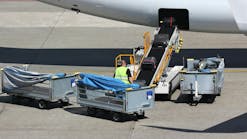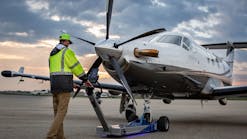WASHINGTON, D.C. — The U.S. Federal Aviation Administration (FAA) and the Network Centric Operations Industry Consortium (NCOIC) entered into an agreement to advance the Enterprise Architecture of NextGen, FAA's national airspace (NAS) transformation program. NCOIC's FAA contract has a potential value of approximately
The NCOIC will analyze and evaluate NextGen's enterprise architecture views, products, plans, net-centric patterns, and operational concepts. Working collaboratively, its members will develop "voice of industry" recommendations about applying net-centric standards to the NextGen procurement, as a way to achieve interoperability in the NAS and, potentially, the skies beyond U.S. borders.
"We anticipate that the standards recommendations, best practices and net-centric pattern development derived from our collaboration will strengthen NextGen's requirements," says Terry Morgan, NCOIC executive chairman. "Our recommendations will be founded on the thoughts of multi-national, multi-industry leaders in net-centricity."
Industry's review of a major acquisition's enterprise architecture — prior to developing proposal requirements — is a pioneering effort conceived by the FAA. Its agreement with NCOIC supports a forum for peer review, through which industry can provide its expertise to FAA throughout NextGen's lifecycle, from research through disposition; FAA will remain the final authority on enterprise architecture decisions.
The significance of implementing a NextGen enterprise architecture based on open standards — and designed to enable network-centric operations — includes the following: delivering vital information to those who operate the NAS; speeding system development and reducing procurement cost through re-use of software, patterns and best practices; effectively bringing legacy systems into an interoperable enterprise; and supporting the seamless integration of rapidly emerging commercial technology into NextGen. The resulting benefit could be a technologically "evergreen" system that enhances controllers' ability to manage traffic, increases passenger safety, reduces airport flight delays, and advances the airlines' drive to achieve greener operations.
For more information visit www.NCOIC.org.




